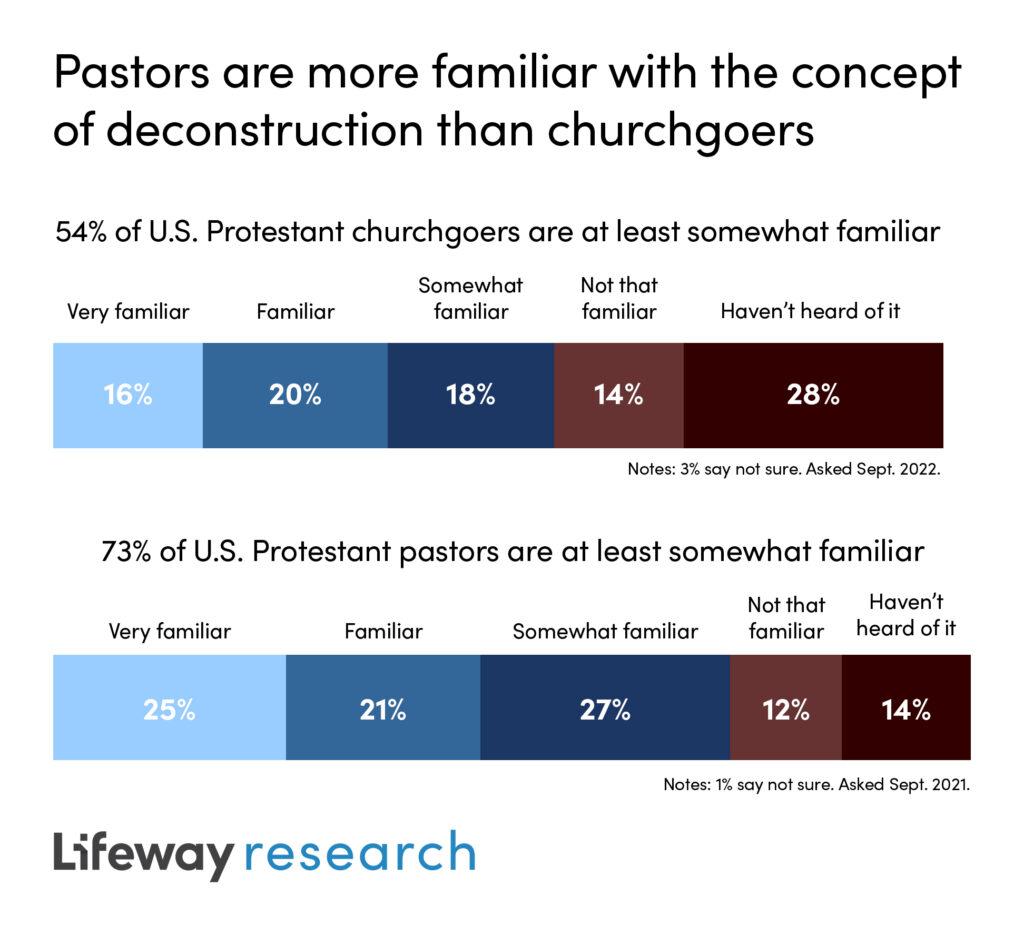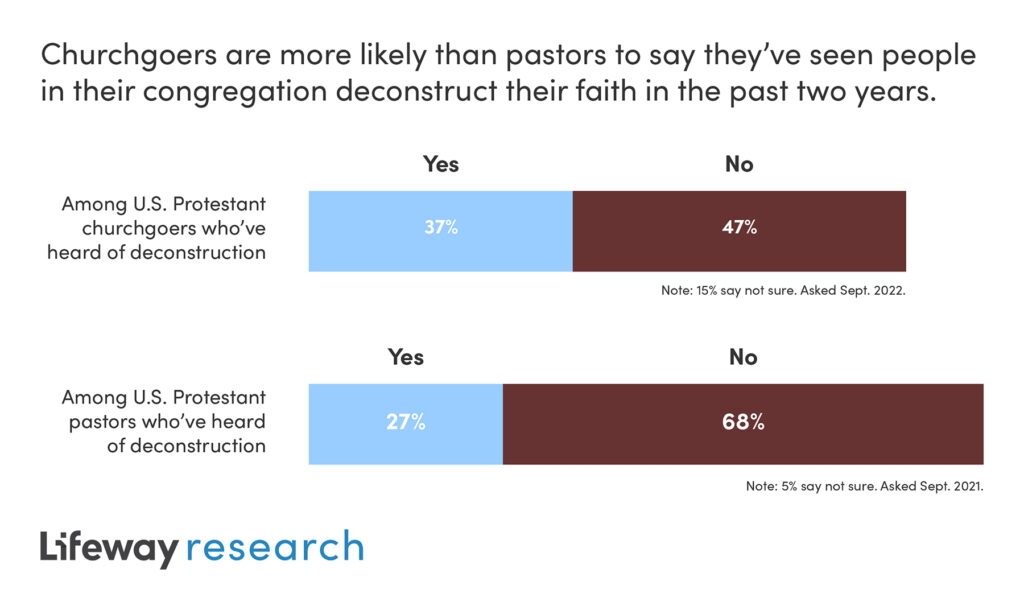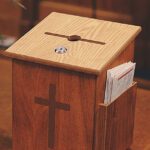
More than 1 in 3 churchgoers who have heard of deconstruction have seen it play out among church attendees in their congregations.
By Marissa Postell Sullivan
Many churchgoers are not familiar with the term “deconstruction,” but if they are, they’ve likely seen it within the church pews they sit in on a regular basis.
A Lifeway Research study of Protestant churchgoers in the United States found more than 1 in 3 (36%) are familiar or very familiar with “the concept of an individual deconstructing their faith in which they systematically dissect and often reject Christian beliefs they grew up with.” Meanwhile, more than 1 in 4 (28%) have not heard of the term before.
More than 1 in 3 U.S. Protestant churchgoers (36%) are at least familiar with the concept of deconstruction. Meanwhile, more than 1 in 4 (28%) have not heard of the term before. Click To TweetA similar Lifeway Research study shows pastors are more likely to be familiar with deconstruction. Among U.S. Protestant pastors, more than 2 in 5 (46%) are familiar or very familiar with the concept of deconstruction, and 14% have not heard the term.
However, among those who have heard of the term, churchgoers are more likely than pastors to say they have seen attendees of their church methodically deconstruct their faith (37% v. 27%).
“It’s not surprising the majority of churchgoers are not very familiar with the term ‘deconstruction,’ since it often describes a person’s private journey or one that’s shared within a limited social set,” said Scott McConnell, executive director of Lifeway Research.
“The fluid nature of the term and its affinity among those on social media or podcasts distances it from many Christians. The term can be used both to represent a total abolishing of one’s faith or to describe one’s personal questioning and working out their salvation to greater faith.”
Among those who have heard of deconstruction, churchgoers are more likely than pastors to say they have seen attendees of their church methodically deconstruct their faith (37% v. 27%). Click To TweetFamiliarity with the term
There is a correlation between the churchgoer’s age and their familiarity with the term “deconstruction.” Churchgoers over the age of 65 are the most likely to say they have not heard the term “deconstruction” before (51%) and the least likely to say they are familiar or very familiar with the term (12%). The younger the churchgoer, the more likely they are to have heard the term before and be familiar with it.

Similarly, younger pastors, those 18-44, are the most likely to say they’re very familiar with deconstruction (36%), while pastors 65 and older are the least likely to possess that same level of familiarity (12%).
“The study did not ask churchgoers the characteristics of those they see deconstructing their faith, but strong age patterns in those noticing the dissection of their faith imply it is more common among those under age 50,” McConnell said.
African American pastors are more likely than white pastors to not have heard of deconstruction (24% v. 13%). Within the pews, however, white churchgoers (33%) are among the most likely and African American churchgoers (16%) are among the least likely to say they’re not familiar with the term.
Churchgoers with evangelical beliefs are less likely than those without these beliefs to be familiar or very familiar with the term “deconstruction” (33% v. 39%) and more likely to have not heard the term before (32% v. 26%).
Deconstruction in the pews
More than 1 in 3 churchgoers who have heard of deconstruction have seen it play out among church attendees in their congregations (37%). The oldest churchgoers, those over 65, are the most likely to say they have not seen it in the pews of their churches (64%). And younger churchgoers, those age 18-34 (48%) and 35-49 (49%), are more likely to say they have than those age 50-64 (31%) and over 65 (15%).

Denominationally, Methodist (19%) and Restorationist movement (29%) churchgoers are among the least likely to say they have not seen deconstruction among attendees in their churches. However, the majority of Methodist (63%) and Restorationist movement (55%) pastors say they have not seen people in their congregation deconstructing their faith.
“While the majority of churchgoers have not seen anyone in their own congregation deconstructing their faith, the numbers are not insignificant,” McConnell said. “When a culture moves away from God, individuals question the teachings they have received.”
Similar to the fact that evangelical pastors are more likely than mainline pastors to say they haven’t seen deconstruction taking place in their churches (72% v. 62%), churchgoers with evangelical beliefs are more likely than those without evangelical beliefs to say they have not seen someone in their church deconstruct their faith (54% v. 43%).
For more information, view the complete report.

Methodology
Lifeway Research conducted the online survey of 1,002 American Protestant churchgoers Sept. 19-29, 2022, using a national pre-recruited panel. Respondents were screened to include those who identified as Protestant/non-denominational and attend religious services at least once a month. Quotas and slight weights were used to balance gender, age, region, ethnicity, education and religion to more accurately reflect the population. The completed sample is 1,002 surveys. The sample provides 95% confidence that the sampling error from the panel does not exceed plus or minus 3.3%. This margin of error accounts for the effect of weighting. Margins of error are higher in sub-groups.
Comparisons are made to a Lifeway Research phone survey of Protestant pastors conducted Sept. 1-29, 2021.
“Evangelical beliefs” are defined using the National Association of Evangelicals and Lifeway Research evangelical beliefs research definition based on respondent beliefs. Respondents are asked their level of agreement with four separate statements using a four-point, forced-choice scale (strongly agree, somewhat agree, somewhat disagree, strongly disagree). Those who strongly agree with all four statements are categorized as having Evangelical Beliefs.
- The Bible is the highest authority for what I believe.
- It is very important for me personally to encourage non-Christians to trust Jesus Christ as their Savior.
- Jesus Christ’s death on the cross is the only sacrifice that could remove the penalty of my sin.
- Only those who trust in Jesus Christ alone as their Savior receive God’s free gift of eternal salvation.











